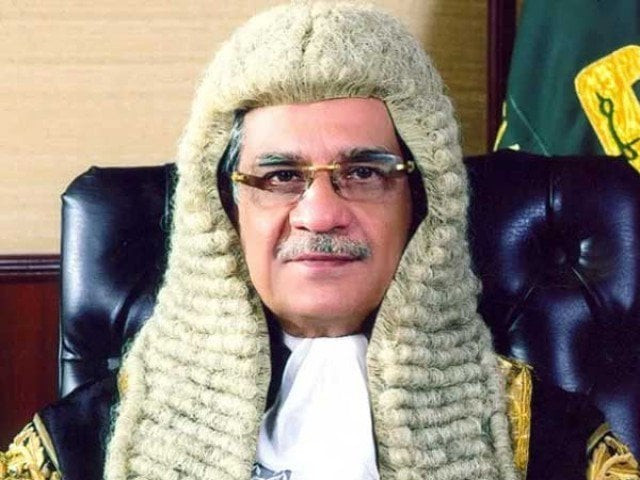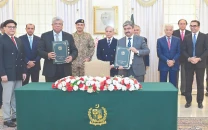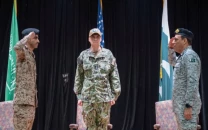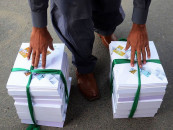Why 18th Amendment passed without debate, wonders CJP
Top judge says federal government has not been restrained from building hospitals in provinces following the amendment

CJP Nisar. PHOTO: FILE
Heading a five-justice larger bench on a matter related to the devolution of federal hospitals to the provinces, the chief justice wondered as to why there was no debate on the 18th Constitutional Amendment before its passage from parliament.
The bench, also including Justice Umar Ata Bandial, Justice Maqbool Baqar, Justice Faisal Arab and Justice Ijaz ul Ahsan, is seized with the issue that under what "legal instrument" federal hospitals could be devolved to the provinces after the 18th Amendment.
Rollback of 18th amendment to be disastrous: Rabbani
The court is hearing an appeal of the Sindh government against a Sindh High Court ruling in 2016, which declared that the hospitals, such as Jinnah Postgraduate Medical Centre (JPMC), National Institute of Cardiovascular Diseases (NICVD), National Institute of Child Health (NICH) could not be devolved.
During Thursday's hearing, Chief Justice Nisar observed that there was no legal bar on the federal government from establishing hospitals in the provincial territory, adding that location was not relevant in this regard.
When the PPP leadership warns against any rollback of the 18th Amendment, the chief justice asked if a provincial government was unable to perform its function and there was a vacuum, under what law the federal government was prohibited to play its role.
He wondered that how was that possible that the federal government built hospitals and then left in the hands of the provinces to destroy by overstaffing etc. He further questioned whether the federal government could not run school or hospital in the provinces.
Addressing Sindh government's counsel Farooq H Naeek the chief justice asked about the legal instrument, which had been used to devolve those health facilities to the province of Sindh after the passage of 18th Amendment. Naek informed the bench that health had always been a provincial subject.
The chief justice asked why public debate was not initiated before the 18th Amendment to know the intent of legislature. Parliamentary debates were relevant to interpret any constitutional provision, he said, adding when court highlighted such anomalies, it was said that the judiciary was interfering.
NICVD counsel Raza Rabbani informed the bench that the draft of the 18th amendment bill took nine months to prepare. He admitted that the bill was not debated on the floor of house but said that 981 suggestions were referred to parliamentary committee for consideration.
The lawyer argued that if the federal government was allowed to establish and run hospitals in the provincial territory, Article 137 of the Constitution would be redundant and in that way the federal government would usurp power of province.
What would be the purpose of 18th Amendment if that happened, he said. Rabbani recommended to the court to refer the matter to parliament to resolve the anomaly. Sitting on the bench, Justice Ahsan said that it was parliament's jurisdiction to make laws and frame constitution and the Supreme Court's power was to interpret them.
The hearing was adjourned till Friday (today) and Rabbani will resume his arguments.
In a separate case about the functioning of land revenue officials -- Patwaris, Kanungos and Tehsildars -- a three-judge bench, headed by Chief Justice Nisar restricted role of Patwari in the sale, purchase or transfer of land in urban areas.
The court ordered that the Patwarkhanas and Revenue record office's jurisdiction would only be limited to protecting land records and they would have no authority to transfer land. The chief justice remarked that Patwaris could only collect information and get revenues from agricultural land and nothing else.
‘NAO exists despite passage of 18th amendment’
"How is this possible that the federal government builds hospitals and leaves it at the hands of the provinces to destroy," Justice Nisar remarked.
Rabbani stated that the court should ask the parliament to resolve this issue.
To this, Justice Ijazul Hasan responded saying that the parliament has performed its duty, now it's the court's responsibility to interpret the law.
Land will be transferred only under the Land Revenue Act and there will be no sale and purchase in the urban areas on a verbal commitment, the bench ruled. The chief justice remarked that there was no need for Patwarkhanas in areas where the Land Revenue Act had been implemented.
Earlier, Supreme Court Bar Association President Aman Ullah Kanzai informed the bench that the matter rested with the interpretation of law. The chief justice questioned why the property records could not be computerised in this space age when people had landed on the Moon.
Justice Ijazul Ahsan questioned the transparency of the land records system and remarked that "there are master plans in the cities, then how could the sale and purchase of properties not be put on the master plan." The bench wrapped up the case by banning role of Patwaris in land transfer.



















COMMENTS
Comments are moderated and generally will be posted if they are on-topic and not abusive.
For more information, please see our Comments FAQ